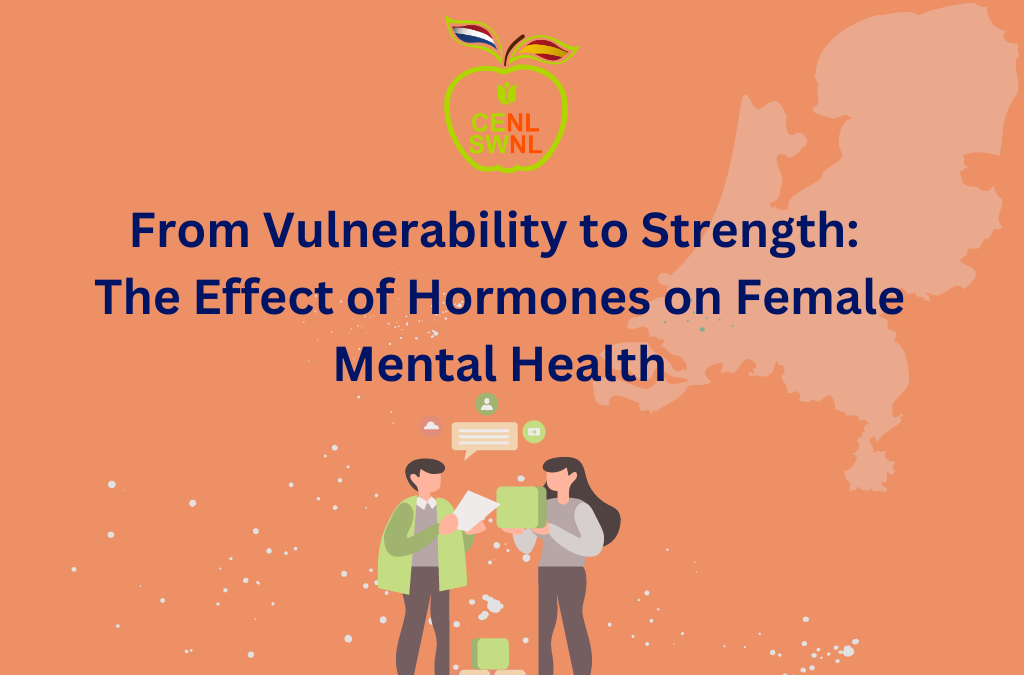Hormones and mental health: the invisible impact of the menstrual cycle in women
From our first menstrual cycle at puberty to the last one before menopause, women face unique challenges that directly impact our mental health. It is no coincidence that we are twice as likely as men to suffer from anxiety disorders or depression. These disorders are not only influenced by social and psychological context but also by something more profound and often overlooked: our hormones.
Throughout the menstrual cycle, we experience changes that affect our mood, cognitive ability, and stress levels. However, we often do not fully understand why we feel a certain way at certain times of the cycle. During the luteal phase, just before menstruation, women are especially vulnerable to symptoms of anxiety and depression. This period is marked by an increase in progesterone and a decrease in estrogen, two hormones that play a crucial role in mood regulation and cognitive abilities. However, these hormonal changes are not limited to the menstrual cycle; they also intensify at other critical stages of life, such as pregnancy, postpartum, use of hormonal contraceptives, and menopause.

From ignorance to knowledge
Historically, the impact of these hormonal fluctuations on mental health has been ignored, leaving many women uncertain about whether their experiences are normal and how to manage them. But, fortunately, times are changing. Behavioral Neuroendocrinology focused on women’s health is gaining ground and, with it, a greater understanding of how female hormones affect our well-being.
The field of Behavioral Neuroendocrinology is dedicated to investigating how hormones influence brain functioning and behavior, and within this field we can find a stream of research focused on female hormones and how they affect women’s mental health. The objectives of the field are very diverse, and certainly multidisciplinary. For example, we can find studies with rodents that try to decipher the most fundamental effects of female hormones on the brain, since animal models provide us with more detail and more control when studying the brain than human models. Other studies compare psychological processes between men and women using normative populations. There are also studies that focus in more detail on certain conditions associated with hormonal fluctuations and their effects on physical and mental health, such as Premenstrual Dysphoric Disorder (PMDD) which is characterized by a drastic accentuation of psychiatric symptoms during the premenstrual phase of the cycle. And of course, we cannot forget the developmental currents, which will focus more on hormonal effects on the brain and behavior during stages of major hormonal changes, such as pregnancy or postpartum.
In my case, my predoctoral research together with my supervisors, Prof. Dr. Karin Roelofs, Dr. Anna Tyborowska and Dr. Eliana Vassena, at Radboud University’s EPAN lab focuses on how hormonal fluctuations during the menstrual cycle affect two psychological processes fundamental to mental health: emotional control and motivation. These are key tools for adapting quickly to the demands of our environment. Emotional control is the strategies we implicitly use to alter or regulate the subjective aspects of an emotional response. Motivation is the force that directs, maintains and regulates behavior toward achieving a goal or satisfying a need.
Although mental health research has often pointed to a “window of vulnerability” during the mid-luteal phase associated with progesterone, there are also indications that at other times of the cycle hormonal fluctuations are favorable. For example, recent studies have shown that female athletes show better performance during the follicular phase. These findings have inspired me to investigate not only the “windows of vulnerability”, but also what I like to call “windows of strength”, i.e. those moments when hormonal fluctuations can be our allies in terms of emotional resilience and cognitive abilities.
One of the biggest challenges in this field is the lack of resources to conduct high-quality research. To obtain robust results, it is essential to use sophisticated techniques of hormone analysis, neuroimaging and to offer fair compensation to participants for their time and effort. Often, when submitting research proposals, I have encountered the question, “What about the men?” Fortunately, the scientific community is beginning to understand the importance of focusing on issues that differentially affect the female population. For too long, stereotypes such as “women are too hormonal” have led to the exclusion of women in clinical studies or the simplification of their experiences to include only women in the same phase of the menstrual cycle.
In perspective, 58% of women of reproductive age experience the menstrual cycle and its associated hormonal changes. In a broader societal context, these studies are part of the growing recognition of the impact of menstrual health on mental well-being, supporting evidence-based policymaking and contributing to the ongoing debate. The results could support the development of prevention strategies, educational initiatives, workplace policies, and health practices, promoting an environment that recognizes and accommodates women’s specific challenges at different stages of hormonal transition. Finally, I would like to highlight that in Spain, we also have research teams dedicated to this area, such as the laboratory of Dr. Susana Carmona at the Hospital General Universitario Gregorio Marañón. Her team, NeuroMaternal, studies the brain changes associated with pregnancy, motherhood, and fatherhood, thus contributing to the growing body of knowledge on female mental health.
To learn more...
If you’ve made it this far, and you’re interested in digging deeper into the connection between hormones and mental health, I recommend:
– Introductory: “Period Power: Harness Your Hormones and Get Your Cycle Working For You” by Maisie Hill. This book is the first approach to how hormonal changes during the menstrual cycle affect the lives of people with a menstrual cycle.
– On a more detailed level, I also leave you a list of current researchers who are dedicated to making advances in this topic: Emily Jacobs, Birgit Derntl, Belinda Pletz, Claudia Barth, Julia Sacher, Alkistis Skalkidou, Lotte Gerritsen, Ellen de Bruijn, Liisa Galea, Ann-Marie de Lange, Tory Eisenlohr-Moul, and again mention Susana Carmona.
Can you help us to be more CENLers? Become a member and participate. Spread the word on the networks. Contact us and tell us about you and your project.

Marta Gómez Vargas
PhD student at Radboud University
I have always spent a lot of time thinking about people’s behavior, which led me to specialize in behavioral science, data analysis and neuroscience. Currently, my research focuses on how female hormones influence behavior and mental health. In addition, I am part of the research and clinical affairs team at Clue, a menstrual tracking app based in Berlin.
I am originally from Las Cabezas de San Juan, a village in Seville, and although I am now in the Netherlands, someday I would love to go back to Andalusia and get all the sun that I am missing these years! I love spending time outdoors, traveling, and having more hobbies than free time, like skating, sewing, painting or climbing.

